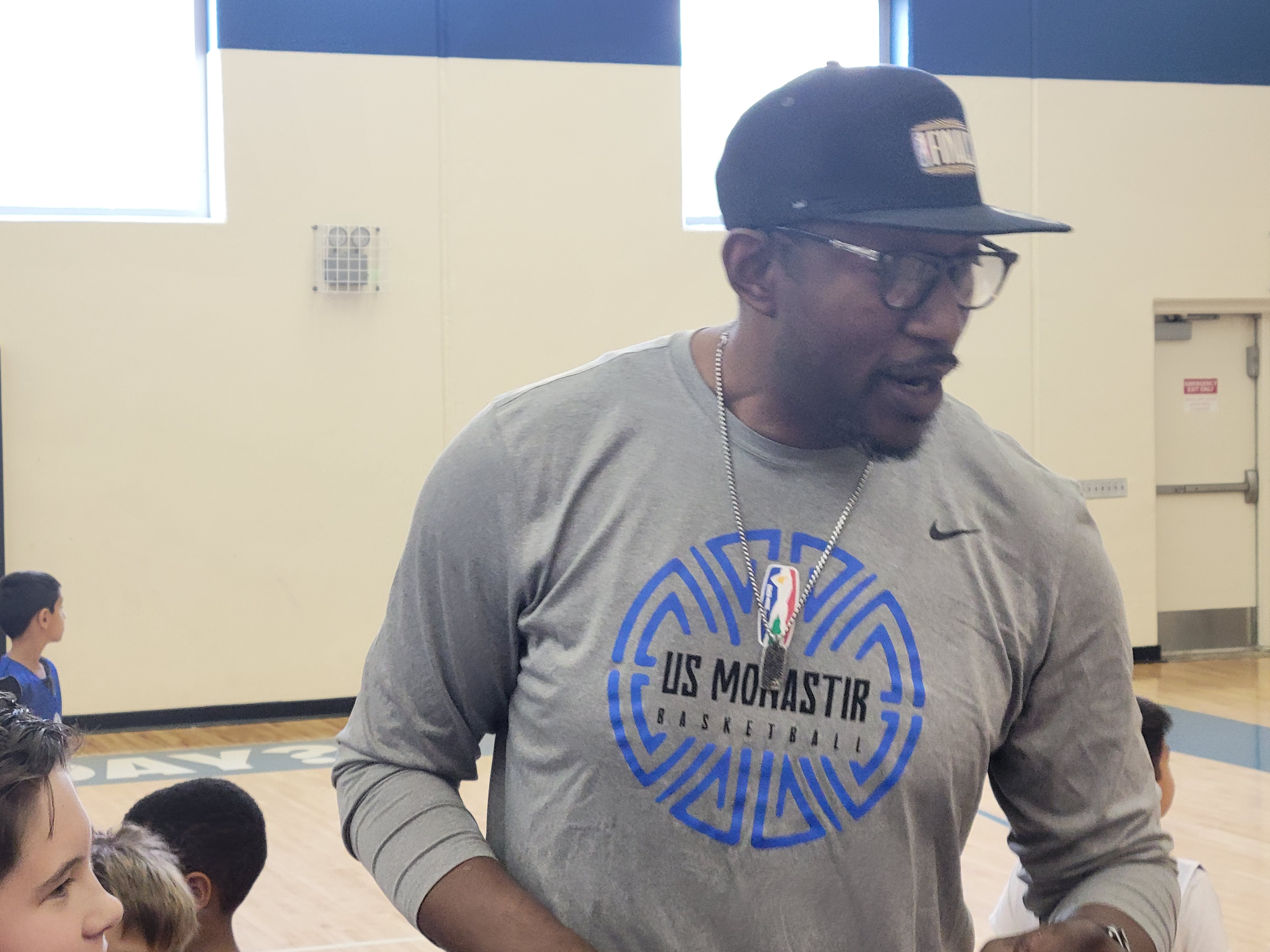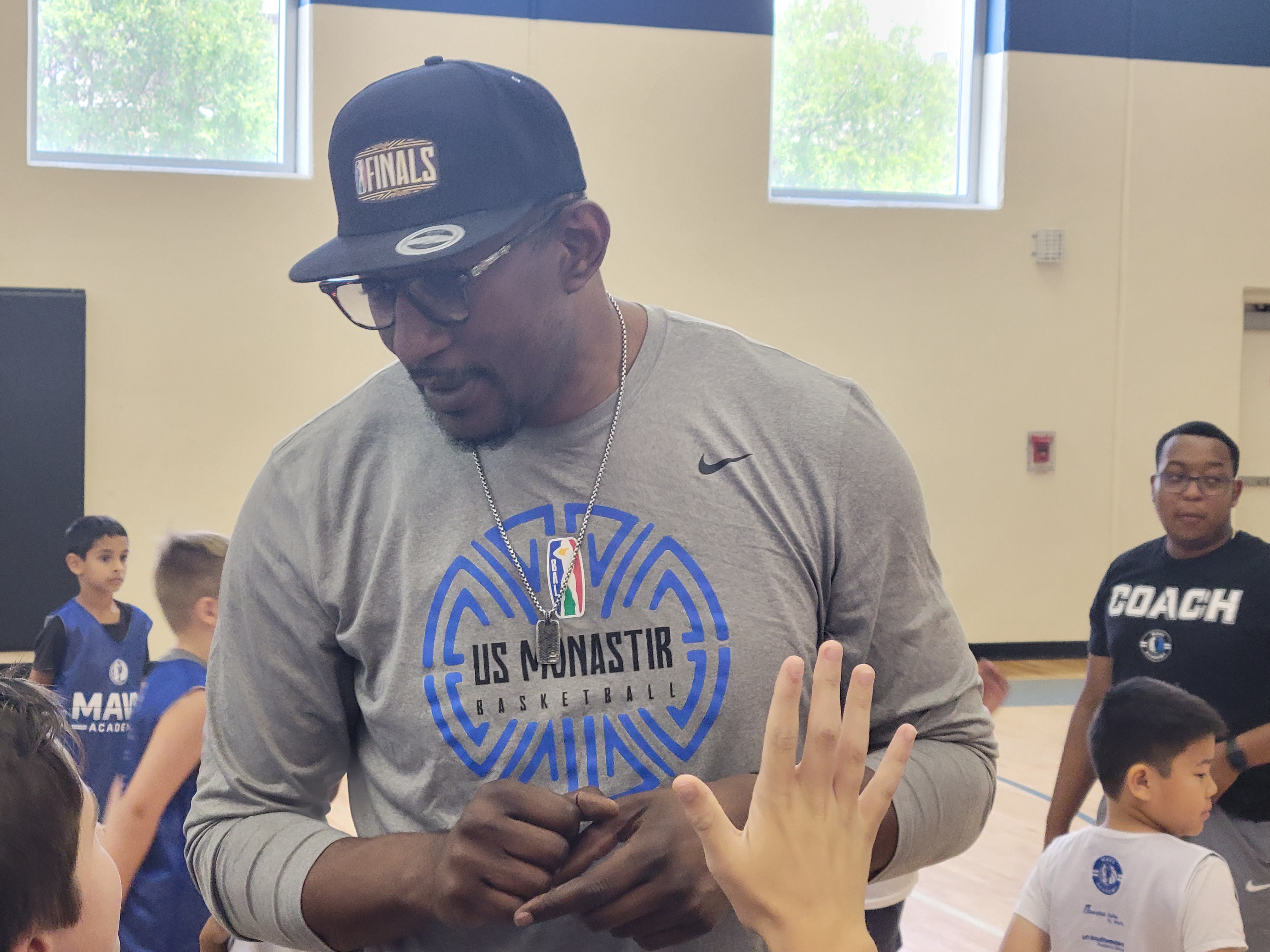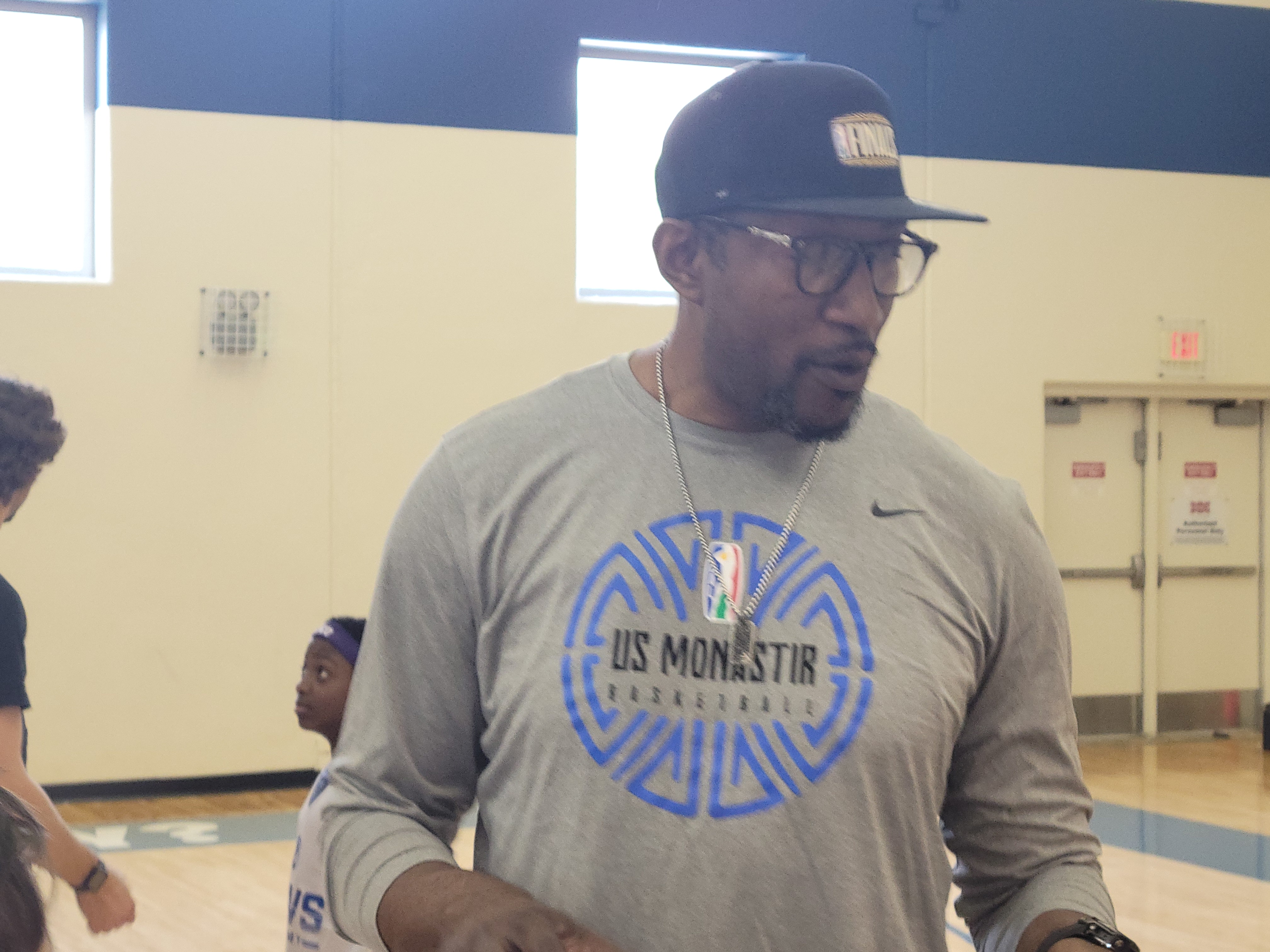FRISCO – DJ Mbenga knows a thing or two about winning an NBA championship. The 7-foot, 245-pounder was a reserve center on the Los Angeles Lakers’ squad that captured back-to-back titles in 2009 and ’10.
center on the Los Angeles Lakers’ squad that captured back-to-back titles in 2009 and ’10.
So, when Mbenga was asked Wednesday how close are the Dallas Mavericks to winning the franchise’s second NBA title, he raised his right hand and there was less than an inch separating his thumb from his index finger.
“They can make it this year coming up,” said Mbenga, who spoke at the Mavs Academy Hoop Camp inside the Frisco Athletic Club. “They don’t need a lot of stuff.
“They have to get a good big man who can bring the good energy and rebound and block shots. Especially the energy, because that’s the key. And then they need a few guys who can defend and protect Luka (Doncic).”
Mbenga played seven years in the NBA, including for the Mavs from 2004-’07. He was part of the Mavs’ first-ever participation in the NBA Finals when they advanced to the big game in 2006, where they lost to the Miami Heat in six games.
In addition, Mbenga played the 2007-08 season for the Golden State Warriors and finished his NBA career with the New Orleans Pelicans in 2011.
With Doncic as the Mavs’ superstar, Mbenga knows they already have a solid foundation they can build around. He compares it somewhat to the Warriors, who have won four NBA titles in the past eight years centered on Stephen Curry, Klay Thompson and Draymond Green.
 “They have Luka with the older guys, so you want to keep that base just like Golden State has with those three guys,” Mbenga said. “Now you’re building around that, just like they built with Dirk (Nowitzki) and got the team they wanted and they won the championship (in 2011).
“They have Luka with the older guys, so you want to keep that base just like Golden State has with those three guys,” Mbenga said. “Now you’re building around that, just like they built with Dirk (Nowitzki) and got the team they wanted and they won the championship (in 2011).
“That’s exactly what they need to do with Luka and those other guys. Bring in a good big man who can defend, and the most importantly, bring in people that bring energy, so people who come in the game can come in and have an impact. They don’t need to come in to score. They need to come to defend and maintain the scoring and help the starting five while they breathe a little bit, and then come back to finish the game.”
Mbenga just wishes he had the chance to play basketball at an early age as some of today’s kids. Born in Kinshasa, Zaire – it’s now known as the Democratic Republic of the Congo — Mbenga’s father worked for the government.
And when a new regime took over, they sought out everyone who was employed by the previous regime. Eventually, Mbenga and his family were imprisoned, and he and his mother later were given asylum in Belgium, where they lived in a refugee center.
“My dad was part of the government, and when the regime changed, we started over,” Mbenga said. “I started learning basketball.
“I was there (in the Congo) last week, and it’s messed up. It’s a war in the Congo. When we left that was the beginning. The people who are paying the price are the young kids and the women.”
That’s why Mbenga – as part of the Jr. NBA — spends a lot of his time working basketball camps in African so he can help young kids earn a shot in the NBA, or at least help open the door for them to have a better life. Mbenga saw the fruits of his labor happen for Joel Embiid, who is from Cameroon and a perennial All-Star who signed a four-year, $196 million extension with the Philadelphia 76ers less than a year ago.
“He came from our program – the Jr. NBA,” Mbenga said of Embiid. “If that program works, we can make it better because all these kids, you know all of them can’t come to the league.
“But if we can educate them, if they can get a chance to come to a college just to get educated. . .What I always tell the kids is ‘dreaming about the NBA is good. Being in the NBA is good, but staying in the NBA is another thing.’ We’re doing the camps over there to give the kids a chance.”
A late bloomer, Mbenga didn’t start playing basketball until he was 17 and didn’t make it to the NBA until he was 23. Then, as he tried to progress on the court, he noticed that the language barrier was holding him back.
“When we’re ready, we needed to speak English and we needed to learn the terminology, because for me that was the big problem I had,” he said. “I couldn’t communicate with my teammates, because everything is based in English. So now we’re teaching English to the kids from Africa so when they come here they’re ready. That’s why we started the program.
“We give them an opportunity to be someone in life. I love it because I just came from Africa and I did some work with disability kids.”
During his playing days with the Lakers, Mbenga said “for some reason” he and superstar guard Kobe Bryant got close.
“He always appreciated my hard work,” Mbenga said. “A guy like Kobe – or even Dirk – they have mutual respect if you do what you have to do in practice, and if you respect the game and be on time.
“That dude Kobe, I was blessed to play with a guy like Dirk, Michael Finley, (Jerry) Stackhouse, Josh Howard, Baron Davis, Pau Gasol. But Kobe was just something different. Kobe was somebody who don’t have to tell you to go to work.”
Mbenga said he and Bryant often talked about the World Cup when it was played in South Africa in 2010. He also said when a few of the World Cup games will be played in Arlington in 2026, the folks in the Dallas/Fort Worth area should get out and enjoy the world’s most popular sport.
“In Africa when you’re born, the first gift your dad gives to you is a soccer ball to show other people that that’s my son,” Mbenga said. “We played soccer in the streets. When you come from school, that’s what you do. You play soccer. We’re having fun and people go crazy.
“Soccer unites us, soccer brings big business just like basketball does. I think people should go and watch with interest, because soccer is a beautiful sport.”
Twitter: @DwainPrice
Share and comment